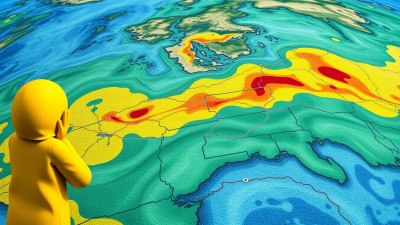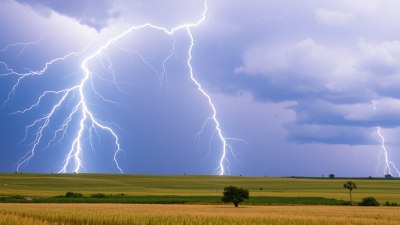How the Weather Low-Key Controls Your Weekend Plans
Explore how weather subtly shapes your weekend choices and activities, influencing everything from outings to mood.

Image created with Flux Schnell
Every weekend, countless plans are made and broken, often driven by a force that many barely notice yet profoundly affects decisions and moods: the weather. This omnipresent factor gently but unmistakably guides how people spend their free time, from simple strolls to elaborate outdoor events. Understanding this subtle influence reveals how the weather low-key controls your weekend plans.
The Unseen Influence of Weather on Decision-Making
Weather conditions might seem like basic background elements, but they play an outsized role in choice architecture for weekends. On sunny days, the impulse to be outdoors intensifies, encouraging activities such as hiking, picnics, or open-air markets. Conversely, gloomy or rainy conditions often nudge people towards indoor activities like cinema visits or home entertainment.
This dichotomy shapes not just individual behavior but entire weekends, with social calendars shifting according to forecasts. The unpredictability of weather, coupled with personal weather preferences, means flexible planning becomes essential. Thus, weather acts as a silent director, orchestrating weekend plans with subtlety rather than force.
Psychology Behind Weather and Activity Choices
Human psychology is closely linked to weather patterns. Seasonal affective disorder (SAD) is a known example how the lack of sunlight impacts mood and can dampen enthusiasm for outdoor events. On bright, warm days, serotonin levels rise, often leading to increased energy and positive feelings, which uplift social interaction and outdoor activity inclination.
Weather not only influences the type of activities chosen but also the willingness and enthusiasm to engage in them. When conditions are ideal, motivation peaks, encouraging more ambitious plans. In contrast, adverse weather conditions generate caution and preference for comfort zones. This dynamic shapes weekend rhythms beyond superficial choices, impacting emotional and social wellbeing.
Weather Patterns and Common Weekend Activities
Each type of weather tends to align with particular weekend activities. Sunny, clear skies encourage recreational sports, beach outings, and gardening. Moderate temperatures stimulate outdoor dining, sightseeing, and festivals. Cooler or rainy days often result in shifts towards cultural events such as museum visits, theater, or cozy gatherings at home.
Moreover, geographic location influences how weather interacts with plans. In coastal regions, sunny days might mean surfing or boating, while in mountainous areas, clear weather is synonymous with hiking and climbing. Rural vs. urban environments also dictate different responses to similar weather, with alternatives varying widely.
Strategic Weekend Planning Influenced by Weather Forecasts
Many people begin their weekend planning by consulting weather forecasts. Knowing if the weekend will bring sunshine or showers, heat or chill, is critical to organizing both simple and complex outings. This preparation minimizes risk of disappointment and enables maximizing enjoyment.
Forecast-based planning includes contingency arrangements: scheduling a picnic with a backup reservation in a nearby café, or reserving tickets for outdoor events with an insurance policy or refund option in case of weather changes. Such strategies reflect how weather control extends beyond immediate comfort to logistical considerations.
Technology Enhancing Weather Impact Awareness
The rise of smartphone weather apps with real-time updates, radar images, and ultra-local forecasts has increased awareness of weather’s dominion over weekend plans. These tools empower people to make more informed decisions, adjust timing, or select alternative activities last minute. Social media also plays a role, with real-time sharing influencing collective plans and sometimes sparking spontaneous gatherings when conditions are ideal.
Advances in meteorological science have also refined the accuracy of predictions, from days to hours ahead, enabling tighter synchronization between weather and activity. Weather alert services prepare communities for sudden changes, preventing disruptions and fostering adaptability. Thus, technology amplifies the low-key but firm grip weather holds on leisure time.
Weather’s Influence on Social Interactions and Group Plans
Weekends often involve social gatherings with friends or family, where weather impacts attendance and mood. Outdoor barbecues, sports games, and festivals may thrive or fail depending on conditions. Group decisions tend to factor in weather-related risks and comfort levels, sometimes leading to compromises or alternative plans.
Weather conditions that promote enjoyment and ease, like gentle breezes and pleasant temperatures, encourage longer stays and more engaging interactions. On the other hand, extreme or unpleasant weather can shorten events, reduce enthusiasm, or even cause cancellations. These social ripples underscore the pervasive weather influence across interpersonal dimensions of weekend life.
Weather and Weekend Travel Considerations
For those who travel to escape routine, weather is a key factor in destination choice and itinerary design. Sunny weekends beckon beach trips, countryside explorations, or visits to outdoor landmarks. In contrast, rainy or cold weather may redirect travelers to urban environments with indoor attractions such as museums, galleries, and shopping centers.
Travelers often monitor weather forecasts intensively before and during trips to optimize enjoyment and safety. Airlines, highways, and tourist facilities also respond to weather trends, illustrating a coordinated system where weekend mobility connects deeply with meteorological patterns.
Impact of Weather on Outdoor Sports and Recreation
Weekend sports events and recreational activities are some of the most weather-dependent plans. Ideal weather is crucial for activities like tennis, cycling, jogging, or team sports to proceed safely and happily. Adverse weather, including heavy rain, snow, or extreme heat, can cancel or postpone events, forcing participants to shift routines.
Organizers often schedule events well in advance but stay vigilant to weather updates, sometimes allowing flexible timing or venue changes. Athletes and amateurs alike develop personal strategies to cope with or exploit weather, such as early morning workouts to avoid heat or selecting weather-resistant equipment.
How Weather Shapes Weekend Shopping Behavior
Even activities like shopping see weekends influenced by weather. On pleasant days, strolling through open-air markets or outdoor malls is inviting, while poor weather drives preference to enclosed commercial centers or online shopping. This impacts vendor strategies, with businesses sometimes scheduling promotions based on anticipated weather conditions to maximize customer flow.
Furthermore, weather-driven moods can affect spending patterns, sometimes encouraging impulsive purchases on sunny days due to elevated happiness versus more reserved spending in dreary weather. Recognizing this connection helps marketers and consumers alike understand subtle motivations behind shopping behavior.
Weather and Weekend Dining Trends
Dining choices over weekends are also weather-sensitive. Warm sunshine favors al fresco dining experiences in patios or gardens, encouraging socialization and relaxation. Cooler or wet weather leads patrons to cozy up indoors or order takeout, shaping restaurant business models and atmosphere.
Seasonal menus often align with expected weather patterns, offering light, fresh dishes in warm months and hearty comfort foods in cooler times. This alignment enhances consumer satisfaction and keeps weekend dining experiences closely intertwined with meteorological conditions.
Emotional Connection Between Weather and Weekend Leisure
Beyond practical considerations, there is a deep emotional connection between weather and leisure enjoyment. Pleasant weather tends to lift spirits and instigate playful moods, enhancing relaxation and creative pursuits. Inclement weather sometimes fosters introspection, quiet hobbies, or intimate moments.
This emotional ebb and flow profoundly affects how weekends are perceived and remembered. The anticipation of nice weather elevates excitement in planning stages, while poor conditions shift focus towards resilience and alternative happiness sources. Weather molds not only actions but memories.
Changing Climate Patterns and Future Weekend Planning
With global climate changes causing more extreme and unpredictable weather, the influence on weekend plans is intensifying. Increased frequency of storms, heat waves, or irregular patterns forces people to become more adaptable and cautious. This unpredictability may reduce the feasibility of traditional weekend outdoor festivities and enrich the repertoire of indoor or weather-friendly activities.
Communities and industries more attuned to climate trends are innovating toward weather-resilient event designs, infrastructure improvements, and flexible scheduling practices. The evolution of weekend planning in response to climate dynamics shows how weather’s control persists and adapts.
Weather’s Impact on Weekend Wellness and Recreation Quality
Physical and mental wellness during weekends also depend on weather. Activities conducted in favorable weather tend to promote cardiovascular health, vitamin D synthesis, and social bonding. Adverse weather, while potentially limiting outdoor exercise, sometimes encourages restorative rest, reading, or home-based hobbies, also beneficial in mental health domains.
Balancing weather influences with personal wellness goals requires awareness and intentionality. Recognizing weather's nuanced role enables optimizing recreation quality regardless of external conditions, blending comfort, health, and enjoyment harmoniously.
Adapting to Weather’s Weekend Influence Creatively
Successful weekend planning embraces weather’s control by adopting creativity and flexibility. For instance, transformative indoor games, virtual meetups, or home gardening during poor weather lift spirits and maintain social ties. Conversely, maximizing outdoor time during favorable conditions includes exploring new routes, photography, or community engagements.
This adaptability enriches the weekend fabric and circumvents rigid dependence on perfect weather, balancing control between environment and individual initiative. It encourages a resilient mindset that ultimately harmonizes personal choice with natural rhythms.
Weather and Weekend Cultural and Community Events
Cultural festivals, farmers markets, and community gatherings often schedule around seasonal weather expectations, planning meticulously to avoid disruptions. Weather impacts attendance rates and atmosphere, with pleasant days drawing crowds and rainy weather reducing engagement.
Organizers frequently employ weather contingency plans such as tents, alternative indoor venues, or rescheduling policies. Local governments and event planners work together to ensure safety and accessibility, illustrating how intertwined weather is with communal weekend experiences.
Economic Implications of Weather on Weekend Industries
The weekend economy, spanning tourism, retail, food service, and entertainment, faces direct economic impacts from weather variability. Favorable weather can boost business revenue, while rain or extreme temperatures may cause cancellations or reduce consumer spending. Businesses increasingly incorporate weather analytics into operation strategies.
Dynamic pricing, inventory adjustments, and marketing campaigns often synchronize with weather trends. Urban planning and infrastructure development also take into account improving resilience to unpredictable weather to sustain economic vibrancy during weekends.
Ultimately, weather’s low-key control over weekend plans is a complex, multi-layered phenomenon. It influences emotions, social interactions, activities, economies, and cultural expressions. Being conscious of this subtle power allows individuals and communities to plan better, adapt faster, and enjoy weekends more fully, irrespective of what the skies bring.











